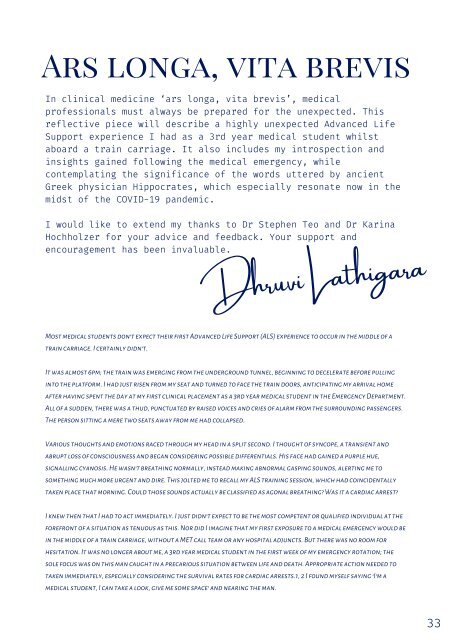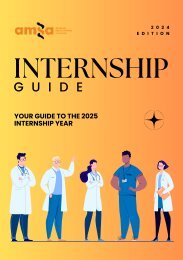PANACEA 2020
panacea /ˌpanəˈsiːə/ noun a solution or remedy for all difficulties or diseases. The term ‘Panacea’ embodies humanity’s unfaltering idealism, our wishful thinking and our unattainable dreams. It is this idealism which lays the foundation for our ambition and perseverance in the face of unparalleled hardship, and which fuels our resilience after defeat. In a time like the present and indeed throughout history, the concept of a ‘Panacea’ has been a frank deviation from reality – it is nothing more than a fantasy or escape. Nonetheless, for us, ‘Panacea’ is a delight, a source of hope and a symbol of our unending optimism. This year, the theme of AMSA’s student magazine, Panacea, is “When the dust settles: Reflection and renewal in a COVID-19 world.” We asked medical students from across Australia to submit written pieces or artwork relevant to the theme, for publication in a colourful and engaging digital magazine. Please enjoy the compilation of these wonderful works in Panacea 2020.
panacea
/ˌpanəˈsiːə/
noun
a solution or remedy for all difficulties or diseases.
The term ‘Panacea’ embodies humanity’s unfaltering idealism, our wishful thinking and our unattainable dreams. It is this idealism which lays the foundation for our ambition and perseverance in the face of unparalleled hardship, and which fuels our resilience after defeat. In a time like the present and indeed throughout history, the concept of a ‘Panacea’ has been a frank deviation from reality – it is nothing more than a fantasy or escape. Nonetheless, for us, ‘Panacea’ is a delight, a source of hope and a symbol of our unending optimism.
This year, the theme of AMSA’s student magazine, Panacea, is “When the dust settles: Reflection and renewal in a COVID-19 world.” We asked medical students from across Australia to submit written pieces or artwork relevant to the theme, for publication in a colourful and engaging digital magazine. Please enjoy the compilation of these wonderful works in Panacea 2020.
Create successful ePaper yourself
Turn your PDF publications into a flip-book with our unique Google optimized e-Paper software.
Ars longa, vita brevis<br />
In clinical medicine ‘ars longa, vita brevis’, medical<br />
professionals must always be prepared for the unexpected. This<br />
reflective piece will describe a highly unexpected Advanced Life<br />
Support experience I had as a 3rd year medical student whilst<br />
aboard a train carriage. It also includes my introspection and<br />
insights gained following the medical emergency, while<br />
contemplating the significance of the words uttered by ancient<br />
Greek physician Hippocrates, which especially resonate now in the<br />
midst of the COVID-19 pandemic.<br />
I would like to extend my thanks to Dr Stephen Teo and Dr Karina<br />
Hochholzer for your advice and feedback. Your support and<br />
encouragement has been invaluable.<br />
Dhruvi Lathigara<br />
Most medical students don’t expect their first Advanced Life Support (ALS) experience to occur in the middle of a<br />
train carriage. I certainly didn’t.<br />
It was almost 6pm; the train was emerging from the underground tunnel, beginning to decelerate before pulling<br />
into the platform. I had just risen from my seat and turned to face the train doors, anticipating my arrival home<br />
after having spent the day at my first clinical placement as a 3rd year medical student in the Emergency Department.<br />
All of a sudden, there was a thud, punctuated by raised voices and cries of alarm from the surrounding passengers.<br />
The person sitting a mere two seats away from me had collapsed.<br />
Various thoughts and emotions raced through my head in a split second. I thought of syncope, a transient and<br />
abrupt loss of consciousness and began considering possible differentials. His face had gained a purple hue,<br />
signalling cyanosis. He wasn’t breathing normally, instead making abnormal gasping sounds, alerting me to<br />
something much more urgent and dire. This jolted me to recall my ALS training session, which had coincidentally<br />
taken place that morning. Could those sounds actually be classified as agonal breathing? Was it a cardiac arrest?<br />
I knew then that I had to act immediately. I just didn’t expect to be the most competent or qualified individual at the<br />
forefront of a situation as tenuous as this. Nor did I imagine that my first exposure to a medical emergency would be<br />
in the middle of a train carriage, without a MET call team or any hospital adjuncts. But there was no room for<br />
hesitation. It was no longer about me, a 3rd year medical student in the first week of my emergency rotation; the<br />
sole focus was on this man caught in a precarious situation between life and death. Appropriate action needed to<br />
taken immediately, especially considering the survival rates for cardiac arrests.1, 2 I found myself saying ‘I’m a<br />
medical student, I can take a look, give me some space’ and nearing the man.<br />
33

















